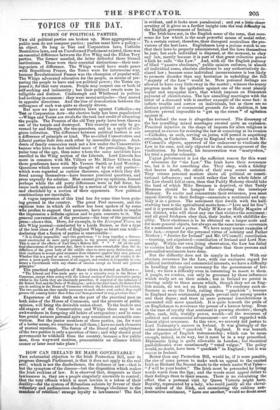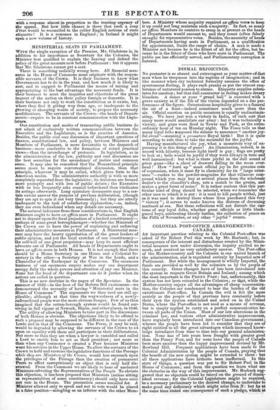HOW CAN IRELAND BE MADE GOVERNABLE? THE substantial objection to
the Irish Protection Bill, now in progress through Parliament, is that it does not apply to the real evil; which is not the disobedience, the defiance of law—that is but the symptom of the disease—but the disposition which makes the Irish reckless of law. It is observed that, desperate as their lawlessness is, they are a people singularly amenable to control; that the very offence which is most lawless is a token of their docility—for the system of Ftibandism subsists by favour of their voluntary and pertinacious obedience. Strange obedience 'to" the mandate of rebellion! strange loyalty to lawlessness! The fact is evident, and it looks most paradoxical ; and yet a little closer scrutiny of it gives us a further insight into the real difficulty in the English government of Ireland.
The Irish have not, in the English sense of the term, that reve- rence for law which is the most powerful means of social order.
To a certain extent, therefore, their disregard neutralizes the pro- visions of the best laws. Englishmen keep a jealous watch to see that their laws be properly administered, that the laws themselves be just; but each individual is disposed, at the moment, to obey any law, merely because it is part of that great collective power which he calls "the Law." And, with all the English jealousy of blind "passive obedience," public opinion enforces, in almost all individual cases, absolute obedience to any authoritatively de- clared law ; because some individual inconvenience is less likely to promote disorder than any hesitation in upholding the full " majesty of the Law " would be. Mere personal feelings are allowed to have very little sway in the matter ; witness the scanty progress made in the agitation against one of the most plainly unjust and unpopular laws, that which imposes on Dissenters payment of church-rates. The law annulling marriages with the
sister Of a deceased wife is another example of the same fact: it inflicts trouble and sorrow on individuals, but as there are no distinct political or commercial grounds for its abolition, it has hitherto proved impossible to "get up the steam" of agitation against it.
In Ireland the case is altogether reversed. The discovery of the law annulling mixed marriages created quite an explosion. Practical injustice in the shape of imposts for alien religions is accepted as excuse for resisting the law or conniving at its evasion —Catholics, as such, serving on juries will persist in acquitting criminals as Catholics. Many in England who agreed with Mr. O'Connell's objects approved of the endeavour to vindicate the Law in his case, and only objected to the mismanagement of the vindication. In Ireland, his incarceration was martyrdom," his trial a popular calamity. Unjust government is not the sufficient reason for this want of reverence for "the Law." The Irish have their reverence
too, but it is for something else. They obey, with a fidelity .that braves death, the edicts of their own secret societies. They esteem personal matters above all political or consti- tutional influences ; and would rather that the whole fabric of
the Law should fall at once, than that Paddy Mahony should take the land of which Mike Brennan is deprived, or that Teddy Brennan should be hanged for shooting the interloper Mahony. To excite and concentrate their reverence, you must appeal directly to their feelings—enunciate a sentiment and ern-
bodyit in a person. The sentiment that dwells with the half- starving race is the agricultural motto here—" Live and let live.; and it is personified in the Paddy M'Kew or Molly Maguire of the district, who will shoot any one that violates the sentiment.: and all good Irishmen obey that, their leader, with childlike do- cility. Their obedience is to be obtained on a larger scale and for more general objects, but always on the same terms—reverence. for a sentiment and a person. We have many recent examples of this fact,—respect for the personal virtue of sobriety and Father
Mathew ; "Justice for Ireland" and Mr. O'Connell ; conciliation —trusting, not stipulated—conciliation of Ireland and Lord Nor- manby. Within our own living observation, the Law has failed to exercise half the controlling influence that those persons and personified sentiments have done.
But the difficulty does not lie simply in Ireland. With our absolute reverence for the Law, with our exclusive regard for political institutions and commercial interests, we have a difficulty
in handling the engines necessary for the government of Ire- land ; we have a difficulty even in consenting to resort to them. A people, we confess, can only be governed by those influences
which really act on their minds ; but in Ireland we persist in trusting solely to those means which, though they act on Eng- lish minds, do not act on Irish minds. We condemn such in- fluences as sway the Irish, calling them " quackish " ; because in England mere sentimental appeals prevail only among quacks and their dupes; and trust in mere personal considerations is accounted still more quackish. It is quite beneath the pride of
an Englishman to reverence the person of a human being. Even in the case of royalty that sentiment is growing obsolete ; though office, rank, title, worldly power, wealth—all the resources of political and commercial advancement—are still rewarded with almost abject reverence. In this view, we scarcely did justice to Lord Normanby's success in Ireland. It was glaringly of the order denominated "quackish" in England. It was beneath the etiquettes of English statesmanship ; which can be mean
enough, indeed, in its way, but it must be in a way prescribed. Diplomatic lying is quite allowable in London ; but theatrical gaol-deliveries were unanimously "voted vulgar." The policy would, no doubt, have been "quackish" in England ; but it was success in Ireland.
Better than any Protection Bill, would be, if it were possible, the rise of some person to make such an appeal to the exqted
Irish as Richard the Second made to the rebels under Wat Tyler— "I will be your leader." The Irish must be persuaded by livizyr words warm from the lips ; and the words must appeal rather to
their feelings than to their reason. There is no calculating tbe
effect that a personal visit by Queen Victoria might have. Royalty-, represented by a lady, who could justify all the chival- rous ardour of the Irish, and enunciating the sublime anti- destructive sentiment, "Love one another," would no doubt meet with a response almost in proportion to the trusting urgency of the appeal. But how little chance is there that such a coup d'etat would be reconciled to the colder English notions of state etiquette! It is a romance in England ; in Ireland it might open a new volume of history.



























 Previous page
Previous page